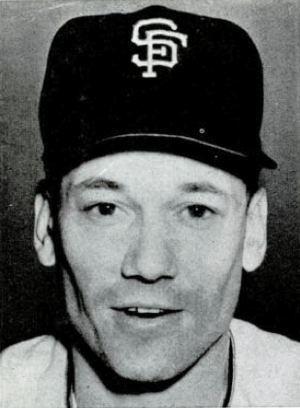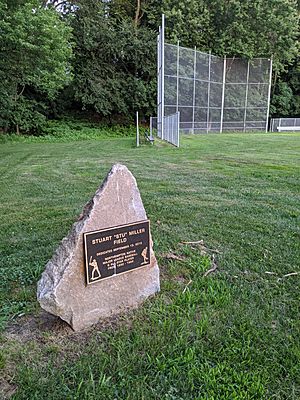Stu Miller facts for kids
Quick facts for kids Stu Miller |
|||
|---|---|---|---|
 |
|||
| Pitcher | |||
| Born: December 26, 1927 Northampton, Massachusetts, U.S. |
|||
| Died: January 4, 2015 (aged 87) Cameron Park, California, U.S. |
|||
|
|||
| debut | |||
| August 12, 1952, for the St. Louis Cardinals | |||
| Last appearance | |||
| April 23, 1968, for the Atlanta Braves | |||
| MLB statistics | |||
| Win–loss record | 105–103 | ||
| Earned run average | 3.24 | ||
| Strikeouts | 1,164 | ||
| Saves | 154 | ||
| Teams | |||
|
|||
| Career highlights and awards | |||
|
|||
Stuart Leonard Miller (born December 26, 1927, died January 4, 2015) was a famous baseball player. People called him The Butterfly Man because of his special way of pitching. He was a pitcher in Major League Baseball for 16 years. He played for teams like the St. Louis Cardinals, Philadelphia Phillies, San Francisco Giants, Baltimore Orioles, and Atlanta Braves. Stu Miller was known for his clever pitching style. He won 105 games and saved 154 games during his career.
Contents
Playing Baseball
Stu Miller was chosen as an All-Star player for the Giants in 1961. His manager, Alvin Dark, thought Stu had the best season of any relief pitcher he had ever seen. A relief pitcher is someone who comes into the game after the starting pitcher. Dark said that starting pitchers would work for seven innings and then expect Stu to come in and finish the game.
The Famous Wind Incident
Stu Miller was part of a very memorable moment in the All-Star Game history. This happened in 1961 at Candlestick Park. A strong gust of wind made Stu sway a little while he was pitching. This caused him to make a "balk." A balk is when a pitcher makes a move that tricks the runners on base. Because of the balk, the runners on base were allowed to move forward.
Some people exaggerated the story, saying the wind blew the 165-pound Miller right off the pitcher's mound. Even with the wind, Stu kept pitching. His teammates helped him out later in the game. In the 10th inning, Stu's Giants teammate Willie Mays hit a double. This tied the score. Then, Roberto Clemente hit a single, and Mays scored the winning run. This made Stu Miller the winning pitcher!
Later Career and Achievements
In 1962, Stu Miller's pitching numbers were not as good as before. The Giants thought he might be too old to play well. So, they traded him to the Baltimore Orioles. But Stu proved them wrong! In 1963, he had a fantastic season. He led the American League in games played (71) and saves (27). A save is when a pitcher finishes a close game and helps his team win. His ERA (a measure of how well a pitcher prevents runs) was very low, at 2.24.
In 1965, Stu had an even better year. He won 14 games and saved 24 games. His ERA was an amazing 1.89. This is still the lowest ERA in the history of the Baltimore Orioles team since they moved to Baltimore.
On April 30, 1967, Stu Miller and another pitcher, Steve Barber, teamed up to pitch a no-hitter for the Orioles. A no-hitter is when no opposing player gets a hit during the entire game. Even though they pitched a no-hitter, they still lost the game 2-1 because of some errors and a wild pitch.
Stu Miller was also known for giving up Mickey Mantle's 500th career home run on May 14, 1967. Even famous pitchers sometimes give up big hits!
Jim Palmer, another great pitcher, said that Stu Miller helped him learn how to pitch better. He said sitting with Stu in the bullpen was like "graduate school."
Pitching Style
Stu Miller earned his nickname The Butterfly Man because of his special way of pitching. He could trick batters with a very slow curveball. His fastball (his fastest pitch) was not super fast, but he had a clever way of throwing that made it hard for batters to hit.
A teammate named Eddie Watt said that Stu was the perfect "off-speed pitcher." This means he relied on slower pitches and trickery, not just pure speed. He was also very brave and not afraid to pitch in tough situations. Stu himself once said that a catcher told him he could catch his pitches with pliers because they were so slow! But the secret was that his slow pitches and slightly faster pitches looked the same when they left his hand. This made it very hard for batters to know what was coming.
Death
Stu Miller passed away on January 4, 2015, at his home in Cameron Park, California. He was 87 years old.
See also
- List of Major League Baseball annual ERA leaders
- List of Major League Baseball annual saves leaders
 | William M. Jackson |
 | Juan E. Gilbert |
 | Neil deGrasse Tyson |


